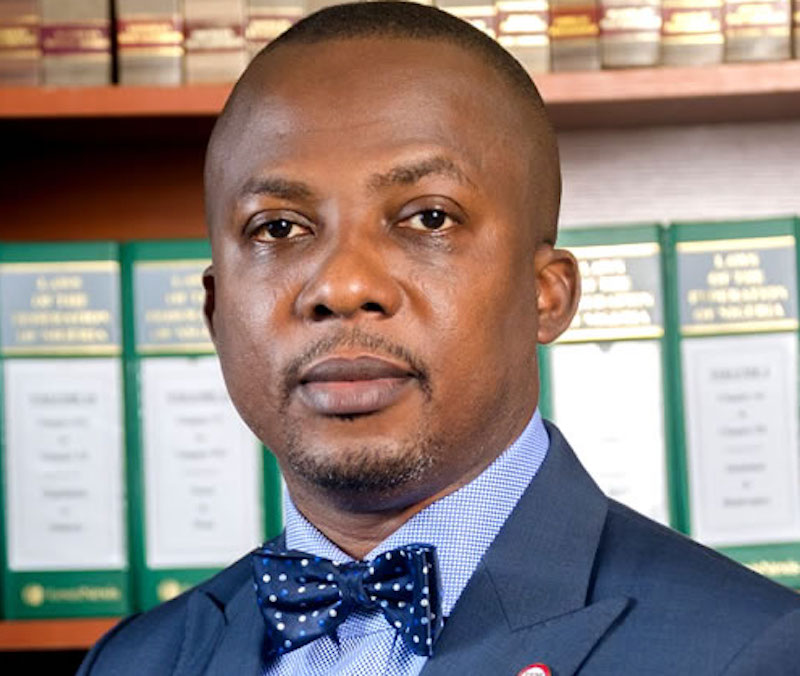...To get all news updates, Join our WhatsApp Group (Click Here)
Also Join our WhatsApp Channel (Click Here)
By Victor Ojelabi
It amazes many how some politicians quickly gather court-like followership that often transcend their generation. Why would the likes of Winston Churchill, D. Roosevelt, Nelson Mandela and the sage himself, Awolowo still command so much respect, many years after their death? Beyond oratory, these figures have an underlining nature of selflessness, deft wisdom and uncommon abilities to get things done and always for the greater good of the society. Politicians in this class live their lives pursuing the dream of a fair and prosperous society so much that it becomes the only image the people hold of them.
One Nigerian political figure that is fast assuming that status is the Special Adviser on Education to the Executive Governor of Lagos State, Barr. Tokunbo Philip Wahab, whose partisan political journey is only short of a decade.
Like the Legends of People Service that were mentioned above, the endearment to the TW brand cascades from his many years in legal practice and private business. And those very close to him often attest that it is his unsatisfied desire to scale up the impact of his programmes for the betterment of the lots of the majority that drove him into active public service. The TW brand that is fast becoming associated with landmark long-term sustainable development projects is one that both the masses and the political class have become connected to.
Though, political kinship these days, particularly in a nation like Nigeria, has been commoditized. Whereby wealthy individuals purchase crowd of supporters and induce loyalty with cheap gifts and bonded favours with thousands chanting their praises because of basic handouts without a deep relation with their values, vision and personality, the soaring followership of TW is by every yard organic, because there is value-based image and his personality, vision and performance easily command bountiful followership.
Leadership positions, the finality of politics and politicking, is a basic output of a life that is predisposed to the nature of selfless service, where the pursuit of the happiness and fulfillment of the other person is always the focus of the leader. This naturally makes more and more people voluntarily put their interests, goals, aspirations, voice and rights in the hands of that individual. The growing attraction to Tokunbo Wahab is easily traceable to his natural ability to indeed lead, gaining tremendous trust and support from all corners and strata of the society!
TW is an amiable leadership brand in the eyes of a lot of people who follow the development of Lagos State. His outlandish impact in the last 3years have drawn a lot of people to him, placed him the radar of progressive governance watchers, sparked curiosity amongst the gentlemen of the press, endeared validity amongst educationist and futurists, placed dignity in the office he occupies, which hitherto was not a highly reckoned position in the large scheme of things in the state.
In 2019, when Babajide Sanwo-Olu struck the right chord by calling TW to join his team in pursuing the THEMES agenda with a major emphasis on education, no one could have imagined what the next three years held for Lagos educational sector.
Here are we in 2022, with accelerated transformation, modernization and diligent purposing of all the fundamental aspects of education in Lagos State to meet the immediate needs and drive the future development of not only the state, but the entire West African region. Now at the brink of another election, if all BOS’ government will judged by are the successes in this sector, a second term ticket will not only be deserving but worth championing by the common man.
Education is said to be an organized mechanism through which society develops its human resources by equipping them with desirable knowledge, skills, attitudes and values which will enable them operate the social institutions of a given country or nation effectively. The state and future of a state is directly proportional to the investment put into quality education of her people.
By TW’s standard, quality means global competiveness. Hence, the use of his office to design and promote a new benchmark and objectives for the substructures of the sector and their managed institutions. LASU’s sporadic climb to the top tier lists of universities in the world, first-of-its-kind training of the heads and management of the state top educational institutions at the University of London, future-proofing programme to digitize libraries across primary, secondary and tertiary institutions across Lagos state are products of a resolve to put Lagos at an advantaged position now and in the future of a rapidly changing and globalised world.
William F. Buckley once said, “I would rather be governed by the first 2,000 people in the telephone directory, than by the Harvard University faculty.”
Of course, this speaks to elitism and how the common person in many ways is superior and better at politics for the good of the people they govern. The philosophy around this is the associative tendencies of experiencing the worst of a society, where the common person can relate with plight of the ordinary man.
A Tokunbo Wahab would perfectly fit into the class of an elite, having enjoyed world-class education in the prestigious Harvard Kennedy School of Governance and Wharton University of Pennsylvania, amongst other things. Just like majority of the ruling class, he’s expected to be classist in approach to leadership and governance – more given to personal ambitions and protecting of the power block.
But for his aggressive drive for the liberation of the people through quality education, one is easily reminded of his humble beginnings and attestable progress through life’s success mountains. From public schools in Epe to polytechnic in Ogun, University of Benin and with such experiences which has apparently formed his appreciative disposition to power, TW connects the divide between the government and the governed, the powerful leader and the common man in many ways deserving of a case study in political science.
So it was quite deserving when Wahab emerged the Most Outstanding Thought Leader in Education at the maiden edition of TheFLEA Awards.
According to the organisers of the awards, the desire to create thought leadership category in key sectors is to acknowledge exceptional personalities making real impact in the lives of the common man in the society.
“In our consideration of suitable candidates in education, we made deliberate effort to review the roles of several non-mainstream political figures – elected office holders, whose major projects are often powered by behind-the-scenes think tanks. Our very vast team indexed quite a number of public servants who fit into our model and after several considerations concluded on awarding it to you based on Eko Digital Initiative and Overall Transformation of Lagos Education,” the award committee revealed.
As Tokunbo Wahab turns 50, majority of his adherent supporters across the world, those he has impacted directly through his programmes, and those he has inspired by his performance and personality, firms up their gaze to the sky to watch this soaring legal eagle glide higher in the ranks, for the sake of our future as a people.
You can get every of our news as soon as they drop on WhatsApp ...To get all news updates, Join our WhatsApp Group (Click Here)
Also Join our WhatsApp Channel (Click Here)

















